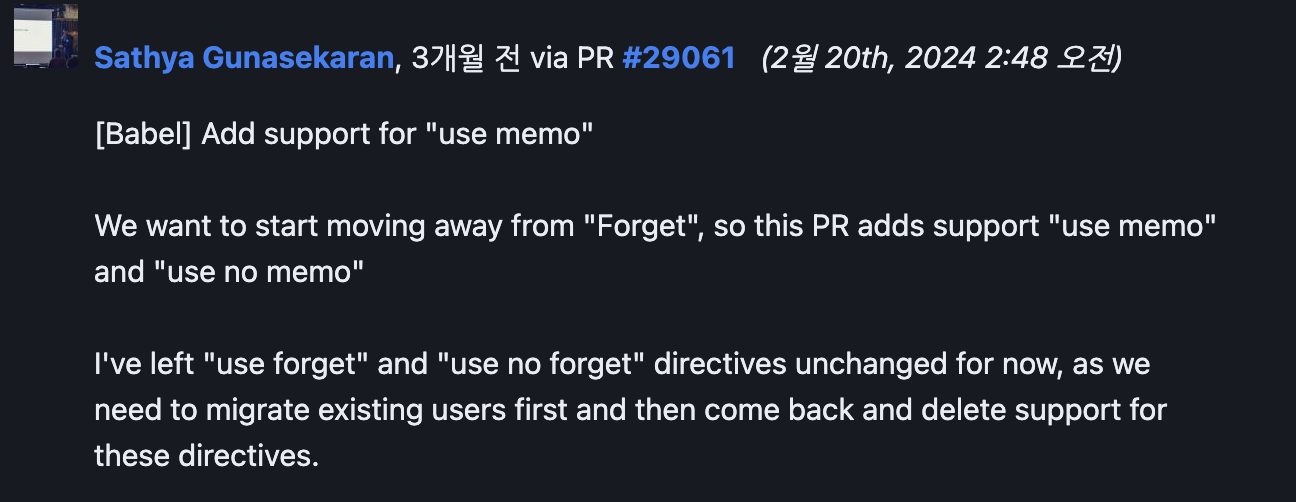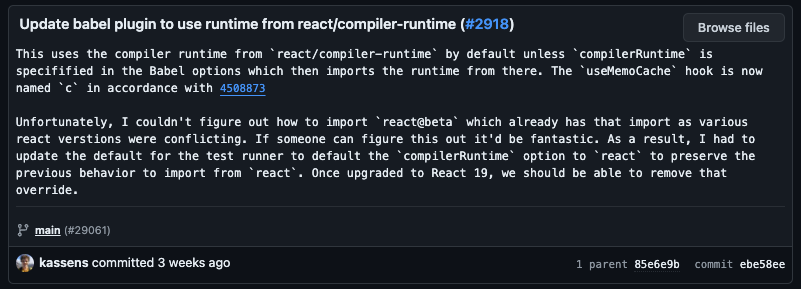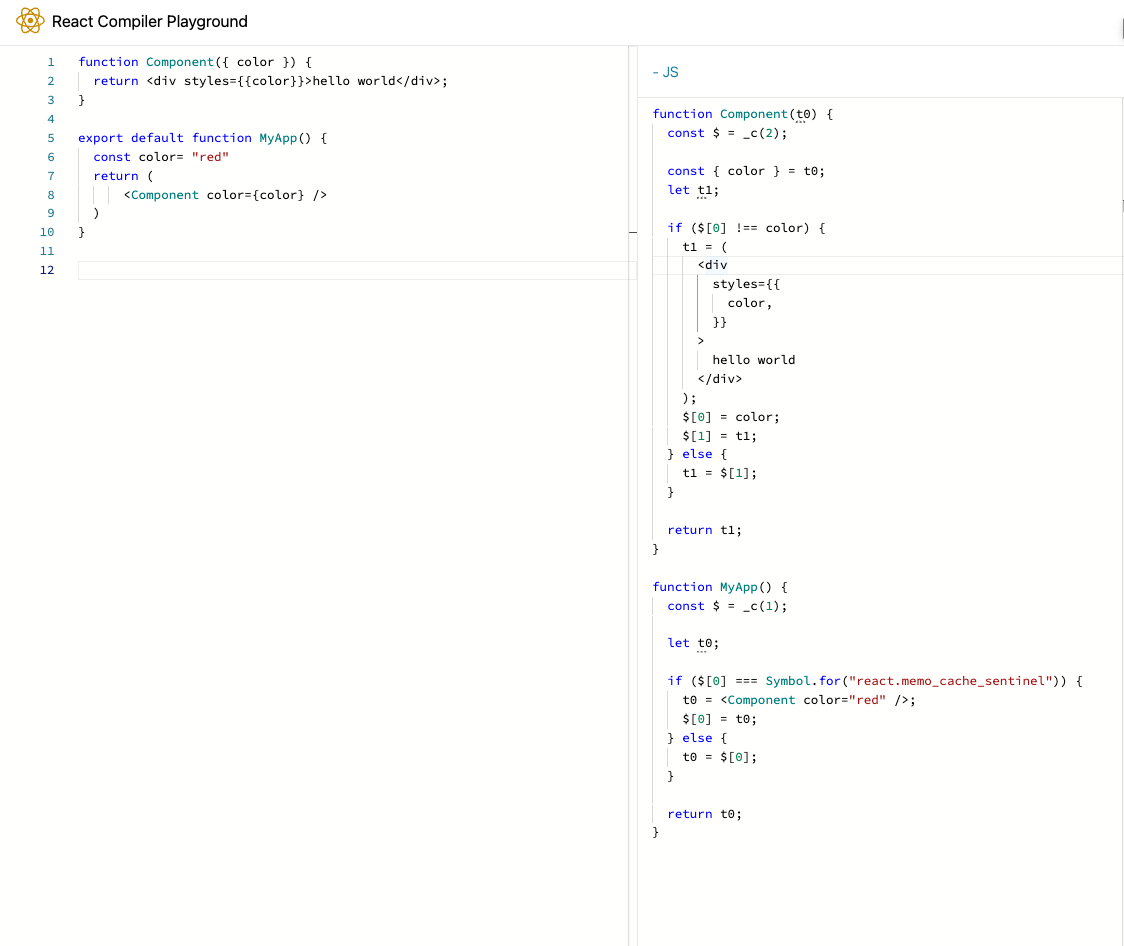It’s already been a week since I returned from React Conf 2024.
Last week I was in Vegas, and now I’m writing this article in a cafe near Yeoksam station.
React Compiler, previously known as React-Forget, which was one of the main topics of the conference, has been released.
Open-source React Compiler by josephsavona · Pull Request #29061 · facebook/react · GitHub
React Compiler is open source!
https://github.com/facebook/react/pull/29061This compiler magically memoizes our React code “just right”.
How long must the React core team have been in seclusion to be able to cast such magic?
The React team has reportedly been interested in compilers for quite some time. (Although not compilers for React) Traces of this can be seen in projects like these:
GitHub - facebookarchive/prepack: A JavaScript bundle optimizer.
A JavaScript bundle optimizer. Contribute to facebookarchive/prepack development by creating an account on GitHub.
https://github.com/facebookarchive/prepackPrepack · Partial evaluator for JavaScript
No description available
https://prepack.io/In this series, we aim to deeply explore the React Compiler.
Let’s gradually examine the entry point through the Babel plugin, the compilation process, memoization, and even the future.
React Compiler
React Compiler – React
No description available
https://react.dev/learn/react-compiler
As the compiler has been released recently, the official documentation may be updated. Refer to the official documentation for detailed explanations.
Currently, the React compiler can be used through a Babel plugin.
https://github.com/facebook/react/tree/main/compiler/packages/babel-plugin-react-compiler
Let’s enter the compiler through this entry point
Entry Point
React Compiler starts compilation through the Babel plugin.
The entry point function BabelPluginReactCompiler finds the Program node through Babel and starts compilation.
Here, the compileProgram function is called, and the compilation process begins.
// react/compiler/packages/babel-plugin-react-compiler/src/Babel/BabelPlugin.ts
import type * as BabelCore from "@babel/core";
// ...
/*
* The React Forget Babel Plugin
* @param {*} _babel
* @returns
*/
export default function BabelPluginReactCompiler(
_babel: typeof BabelCore
): BabelCore.PluginObj {
return {
name: "react-forget",
visitor: {
/*
* Note: Babel does some "smart" merging of visitors across plugins, so even if A is inserted
* prior to B, if A does not have a Program visitor and B does, B will run first. We always
* want Forget to run true to source as possible.
*/
Program(prog, pass): void {
// ...
compileProgram(prog, {
opts,
filename: pass.filename ?? null,
comments: pass.file.ast.comments ?? [],
code: pass.file.code,
});
},
},
};
}
Let’s consider Babel as a black box for now and examine the compileProgram function.
Program
Since the code itself is long, let’s examine it in order of operation.
When compileProgram is executed from the top-level node, the following happens:
// react/compiler/packages/babel-plugin-react-compiler/src/EntryPoint/Program.ts
export function compileProgram(
program: NodePath<t.Program>,
pass: CompilerPass
): void {
// Top level "use no forget", skip this file entirely
if (
findDirectiveDisablingMemoization(program.node.directives, options) != null
) {
return;
}
//...
}function findDirectiveDisablingMemoization(
directives: Array<t.Directive>,
options: PluginOptions
): t.Directive | null {
for (const directive of directives) {
const directiveValue = directive.value.value;
if (
(directiveValue === "use no forget" ||
directiveValue === "use no memo") &&
!options.ignoreUseNoForget
) {
return directive;
}
}
return null;
}First, it checks if there are comments like use no forget or use no memo at the top-level node, and if so, it doesn’t compile. Forget was the previous name of the compiler, so they’re changing it to a more intuitive form of comment, they say.

1. Node Traversal (program.traverse)
It traverses starting from the program node and proceeds with compilation.
// react/compiler/packages/babel-plugin-react-compiler/src/EntryPoint/Program.ts
// ...
export function compileProgram(
program: NodePath<t.Program>,
pass: CompilerPass
): void {
//...
// Main traversal to compile with Forget
program.traverse(
{
ClassDeclaration(node: NodePath<t.ClassDeclaration>) {
node.skip(); // Skip!
return;
},
ClassExpression(node: NodePath<t.ClassExpression>) {
node.skip(); // Skip!
return;
},
FunctionDeclaration: traverseFunction,
FunctionExpression: traverseFunction,
ArrowFunctionExpression: traverseFunction,
},
{
...pass,
opts: { ...pass.opts, ...options },
filename: pass.filename ?? null,
}
);
// ...The program.traverse method takes two arguments, the first of which is an object that defines actions for nodes.
This part shows which elements the compiler skips and which elements it compiles.
ClassDeclarationandClassExpression: Functions defined inside classes can reference this, making them unsafe for compilation.
Therefore, when these nodes are encountered,node.skip()is called to skip visiting the interior.FunctionDeclaration,FunctionExpression,ArrowFunctionExpression: These nodes are all processed through a function calledtraverseFunction.
From what we’ve seen so far, it appears that React Compiler only compiles functions.
2. Traverse Function (traverseFunction)
// react/compiler/packages/babel-plugin-react-compiler/src/EntryPoint/Program.ts
// ...
export function compileProgram(
program: NodePath<t.Program>,
pass: CompilerPass
): void {
//...
const compiledFns: Array<CompileResult> = [];
//...
const traverseFunction = (fn: BabelFn, pass: CompilerPass): void => {
/*
* getReactFunctionType
* ReactFunctionType ("Component" | "Hook" | "Other")
*/
const fnType = getReactFunctionType(fn, pass); // identify the type of function
if (fnType === null || ALREADY_COMPILED.has(fn.node)) { //
return;
}
/*
* We can create a new FunctionDeclaration node, so we need to skip it.
* Otherwise, an infinite loop may occur.
* We need to avoid visiting the original function again.
*/
ALREADY_COMPILED.add(fn.node); // mark as visited
fn.skip(); // Skip visiting the function
let compiledFn: CodegenFunction;
// ...
compiledFn = compileFn(
fn,
config,
fnType,
useMemoCacheIdentifier.name,
options.logger,
pass.filename,
pass.code
);
// ...
compiledFns.push({ originalFn: fn, compiledFn });
};This is the traverseFunction function that compiles functions.
First, it identifies what type of function it is in React terms using getReactFunctionType.
The type itself is not very important here, but when it’s null, compilation is not performed.
The compilation result and the original function are added to the compiledFns array through compileFn.
Before moving on, let’s look at the internal workings of getReactFunctionType to see in which cases compilation is not performed.
1. If the function has ‘use no forget’, ‘use no memo’ comments, compilation is not performed.
It checks for comments using the findDirectiveDisablingMemoization function we looked at earlier.
// getReactFunctionType
const useNoForget = findDirectiveDisablingMemoization(
fn.node.body.directives,
pass.opts
); // 'use no forget' | 'use no memo' | null
if (useNoForget != null) {
return null;
}1.1 If there’s use forget, use memo, it identifies and returns immediately.
// getReactFunctionType
if (findDirectiveEnablingMemoization(fn.node.body.directives) != null) {
// 'use forget' | 'use memo' 인 경우
return getComponentOrHookLike(fn, hookPattern) ?? "Other";
}2. If the compilation mode is annotation, compilation is not performed. (In cases where compilation is activated through directives)
// getReactFunctionType
switch (pass.opts.compilationMode) {
case "annotation": {
// opt-ins are checked above
return null;
}3. If the compilation mode is infer, it identifies components and hooks. (The default mode is infer.)
// getReactFunctionType
switch (pass.opts.compilationMode) {
case "infer": {
// Component and hook declarations are known components/hooks
if (fn.isFunctionDeclaration()) {
if (isComponentDeclaration(fn.node)) {
return "Component";
} else if (isHookDeclaration(fn.node)) {
return "Hook";
}
}
// Otherwise check if this is a component or hook-like function
return getComponentOrHookLike(fn, hookPattern);
}4. If the compilation mode is all, it only compiles top-level functions.
// getReactFunctionType
switch (pass.opts.compilationMode) {
case "all": {
// Compile only top level functions
if (fn.scope.getProgramParent() !== fn.scope.parent) {
return null;
}
return getComponentOrHookLike(fn, hookPattern) ?? "Other";
}3. Replace with Compiled Function
// react/compiler/packages/babel-plugin-react-compiler/src/EntryPoint/Program.ts
// ...
export function compileProgram(
program: NodePath<t.Program>,
pass: CompilerPass
): void {
//...
/*
* Only insert Forget-ified functions if we have not encountered a critical
* error elsewhere in the file, regardless of bailout mode.
*/
for (const { originalFn, compiledFn } of compiledFns) {
const transformedFn = createNewFunctionNode(originalFn, compiledFn);
if (gating != null) {
insertGatedFunctionDeclaration(originalFn, transformedFn, gating);
} else {
originalFn.replaceWith(transformedFn);
}
}It creates a new function node by passing the compiled function and the original to createNewFunctionNode and replaces it.
The internal logic of createNewFunctionNode below is simple. It creates a new node along with some information from the original node according to each node type.
And it marks the compiled function as already visited.
// react/compiler/packages/babel-plugin-react-compiler/src/EntryPoint/Program.ts
export function createNewFunctionNode(
originalFn: BabelFn,
compiledFn: CodegenFunction
): t.FunctionDeclaration | t.ArrowFunctionExpression | t.FunctionExpression {
let transformedFn:
| t.FunctionDeclaration
| t.ArrowFunctionExpression
| t.FunctionExpression;
switch (originalFn.node.type) {
case "FunctionDeclaration": {
const fn: t.FunctionDeclaration = {
type: "FunctionDeclaration",
id: compiledFn.id,
loc: originalFn.node.loc ?? null,
async: compiledFn.async,
generator: compiledFn.generator,
params: compiledFn.params,
body: compiledFn.body,
};
transformedFn = fn;
break;
}
case "ArrowFunctionExpression": {
const fn: t.ArrowFunctionExpression = {
//...
};
transformedFn = fn;
break;
}
case "FunctionExpression": {
const fn: t.FunctionExpression = {
//...
};
transformedFn = fn;
break;
}
}
// Avoid visiting the new transformed version
ALREADY_COMPILED.add(transformedFn);
return transformedFn;
}4. Update Import
At the end, there’s logic to import useMemoCache if any of the compiled functions are memoized.
useMemoCache is a function needed when compiled functions use memoization.
So this can be seen as adding an ‘Import’ statement to the part where it’s used.
//...
const useMemoCacheIdentifier = program.scope.generateUidIdentifier("c");
const moduleName = options.runtimeModule ?? "react/compiler-runtime";
//...
// Forget compiled the component, we need to update existing imports of useMemoCache
if (compiledFns.length > 0) { // if there are compiled functions
let needsMemoCacheFunctionImport = false; // check if useMemoCache function import is needed
for (const fn of compiledFns) { // traverse the compiled functions
if (fn.compiledFn.memoSlotsUsed > 0) { // if memoSlotsUsed is greater than 0 (memoization is used)
needsMemoCacheFunctionImport = true; // needs useMemoCache function import
break;
}
}
if (needsMemoCacheFunctionImport) { // if useMemoCache function import is needed
updateMemoCacheFunctionImport( // update import
program,
moduleName,
useMemoCacheIdentifier.name
);
}
addImportsToProgram(program, externalFunctions);
}Let’s look at the moduleName and useMemoCacheIdentifier passed as arguments to updateMemoCacheFunctionImport which is called to add “import”.
const useMemoCacheIdentifier = program.scope.generateUidIdentifier("c");
const moduleName = options.runtimeModule ?? "react/compiler-runtime";generateUidIdentifier is a Babel method. It generates a unique identifier through this.
In this case, it’s generating an identifier c, and if it’s duplicated, it will generate with numbers attached like _c, _c2. Reference
moduleName uses react/compiler-runtime if there’s no options.runtimeModule.
The default value of options.runtimeModule is null.
Let’s briefly look at the options.
// react/compiler/packages/babel-plugin-react-compiler/src/EntryPoint/Options.ts
export type PluginOptions = {
// ...
/*
* in which case Forget will import `useMemoCache` from the given module instead of `react/compiler-runtime`.
*
* ```
* // If set to "react-compiler-runtime"
* import {c as useMemoCache} from 'react-compiler-runtime';
* ```
*/
runtimeModule?: string | null | undefined;
}
export const defaultOptions: PluginOptions = {
compilationMode: "infer",
runtimeModule: null,
// ...
} as const;Let’s look at updateMemoCacheFunctionImport again.
// react/compiler/packages/babel-plugin-react-compiler/src/EntryPoint/Imports.ts
export function updateMemoCacheFunctionImport(
program: NodePath<t.Program>,
moduleName: string,
useMemoCacheIdentifier: string
): void {
/*
* If there isn't already an import of * as React, insert it so useMemoCache doesn't
* throw
*/
const hasExistingImport = hasExistingNonNamespacedImportOfModule(
program,
moduleName
);
if (hasExistingImport) {
// Add useMemoCache function to existing import
const didUpdateImport = addMemoCacheFunctionSpecifierToExistingImport(
program,
moduleName,
useMemoCacheIdentifier
);
if (!didUpdateImport) {
throw new Error(
`Expected an ImportDeclaration of \`${moduleName}\` in order to update ImportSpecifiers with useMemoCache`
);
}
} else {
// add new import
addMemoCacheFunctionImportDeclaration(
program,
moduleName,
useMemoCacheIdentifier
);
}
}
function addMemoCacheFunctionImportDeclaration(
program: NodePath<t.Program>,
moduleName: string,
localName: string
): void {
program.unshiftContainer(
"body",
t.importDeclaration(
[t.importSpecifier(t.identifier(localName), t.identifier("c"))],
t.stringLiteral(moduleName)
)
);
}The part where the ‘import’ statement is actually added looks like this:
t.importDeclaration(
[t.importSpecifier(t.identifier(localName), t.identifier("c"))],
t.stringLiteral(moduleName)
)localName gets the passed useMemoCacheIdentifier “_c”, and moduleName gets react/compiler-runtime.
After going through this part, it’s updated to a form like:
import { c as _c } from "react/compiler-runtime";It’s updated to a form like this.
But why is it importing c and not useMemoCache when we’ve been mentioning the keyword useMemoCache?
To track this, we need to look at react/compiler-runtime.
Unlike other parts, it’s being imported from the react package, not from inside the compiler package. Let’s go into React and take a look.

react/compiler-runtime// react/compiler-runtime.js
export {useMemoCache as c} from './src/ReactHooks';It’s exporting useMemoCache as c. That’s why it’s importing c.
This is the default value, and as we saw earlier, it can be imported from a different module depending on the options. Is this considering the scalability of the memoization logic?
Let’s also look at the implementation in react-compiler-runtime, which is another option.
// packages/react-compiler-runtime/src/index.ts
type MemoCache = Array<number | typeof $empty>;
const $empty = Symbol.for("react.memo_cache_sentinel");
/**
* DANGER: this hook is NEVER meant to be called directly!
**/
export function c(size: number) {
return React.useState(() => {
const $ = new Array(size);
for (let ii = 0; ii < size; ii++) {
$[ii] = $empty;
}
// This symbol is added to tell the react devtools that this array is from
// useMemoCache.
// @ts-ignore
$[$empty] = true;
return $;
})[0];
}Here, it’s directly exporting as c and has a simple implementation.
To briefly explain the implementation, it creates an array of size using useState, initializes each element with a symbol called $empty (this symbol is used later in react-devtool).
And it returns this array.
For now, as we’re looking at the overall application process of the compiler, let’s look at how this array is used later.
Compile Complete!
If we go any deeper, we might lose our way, so let’s wrap up the compiler’s application process, which was our original purpose.
The operation of compileProgram ended with adding an import statement for c, which is another name for useMemoCache.
That means the Babel plugin has finished its operation.
Final Summary
To summarize the application process of the React compiler:
- The compiler starts through the Babel plugin, traversing from the top-level Program node.
- It identifies functions among function nodes that correspond to React components and hooks, and performs compilation on these.
- During the compilation process, optimizations such as memoization are applied, and the compiled functions are stored along with the original functions.
- After compilation is complete, it replaces the original functions with the compiled functions.
- Finally, if there are functions where memoization has been applied, it automatically adds an import statement for the useMemoCache function.
Tasting the Compilation Result
Now let’s check the compiled code.
To examine the compilation process, I ran the React Compiler Playground and input some code.
function Component({ color }) {
return <div styles={{color}}>hello world</div>;
}
export default function MyApp() {
const color= "red"
return (
<Component color={color} />
)
}I input this code and was able to see the following compiled result:
function Component(t0) {
const $ = _c(2);
const { color } = t0;
let t1;
if ($[0] !== color) {
t1 = (
<div
styles={{
color,
}}
>
hello world
</div>
);
$[0] = color;
$[1] = t1;
} else {
t1 = $[1];
}
return t1;
}
function MyApp() {
const $ = _c(1);
let t0;
if ($[0] === Symbol.for("react.memo_cache_sentinel")) {
t0 = <Component color="red" />;
$[0] = t0;
} else {
t0 = $[0];
}
return t0;
}
Wow… do you see the codes we looked at earlier?
Each component is calling a memoization function called useMemoCache (_c).
Although it’s still a little, it seems our view of the compiler’s output has broadened.
Let’s take a break in our journey for now.
Next time, let’s look deeper into the operation of useMemoCache and the compilation processes.
[Learn More] But why isn’t there the import statement we looked at length above?
To find this, let’s look at the playground code
// compiler/apps/playground/components/Editor/EditorImpl.tsx
import {
//...
run,
} from "babel-plugin-react-compiler/src";
// ...
function compile(source: string): CompilerOutput {
// ...
for (const result of run(
fn,
{
...config,
customHooks: new Map([...COMMON_HOOKS]),
},
getReactFunctionType(id),
"_c",
null,
null,
null,
)) {
// ...
}
}
export default function Editor() {
// ...
const compilerOutput =compile(deferredStore.source)
// ...
}We looked at the statement executed at the compileProgram level, but in the playground, it’s being executed through the run function.
The run function is a function that compileFn executes during the compilation process of compileProgram.
It’s the part that actually executes the compilation.
// compiler/packages/babel-plugin-react-compiler/src/Entrypoint/Pipeline.ts
export function compileFn(
func: NodePath<
t.FunctionDeclaration | t.ArrowFunctionExpression | t.FunctionExpression
>,
config: EnvironmentConfig,
fnType: ReactFunctionType,
useMemoCacheIdentifier: string,
logger: Logger | null,
filename: string | null,
code: string | null
): CodegenFunction {
let generator = run(
func,
config,
fnType,
useMemoCacheIdentifier,
logger,
filename,
code
);
while (true) {
const next = generator.next();
if (next.done) {
return next.value;
}
}
}We’ll look at this part in more depth next time.
That’s why the import statement is not visible.
If it were executed as we looked at, the result would be like this.
import { c as _c } from "react/compiler-runtime";
function Component(t0) {
const $ = _c(2);
const { color } = t0;
let t1;
if ($[0] !== color) {
t1 = (
<div
styles={{
color,
}}
>
hello world
</div>
);
$[0] = color;
$[1] = t1;
} else {
t1 = $[1];
}
return t1;
}
// ...I don’t have the energy to dive deeper today. Goodbye!